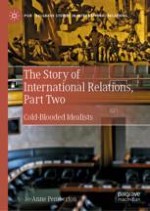
2019 | OriginalPaper | Buchkapitel
1. 1932: Material and Moral Disarmament, a Mission to China and a Conference in Milan
verfasst von : Jo-Anne Pemberton
Erschienen in: The Story of International Relations, Part Two
Aktivieren Sie unsere intelligente Suche, um passende Fachinhalte oder Patente zu finden.
Wählen Sie Textabschnitte aus um mit Künstlicher Intelligenz passenden Patente zu finden. powered by
Markieren Sie Textabschnitte, um KI-gestützt weitere passende Inhalte zu finden. powered by